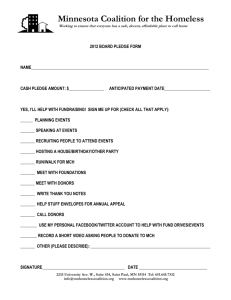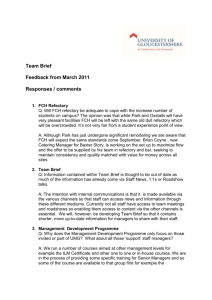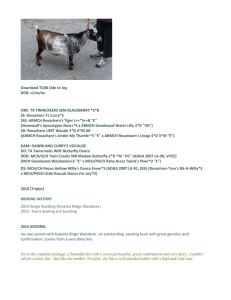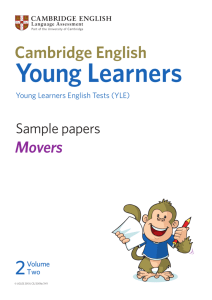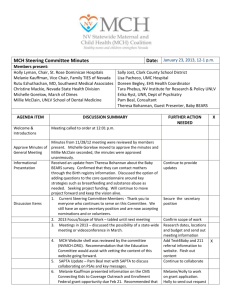YLE - Movers Sample Papers Vol. 1
advertisement
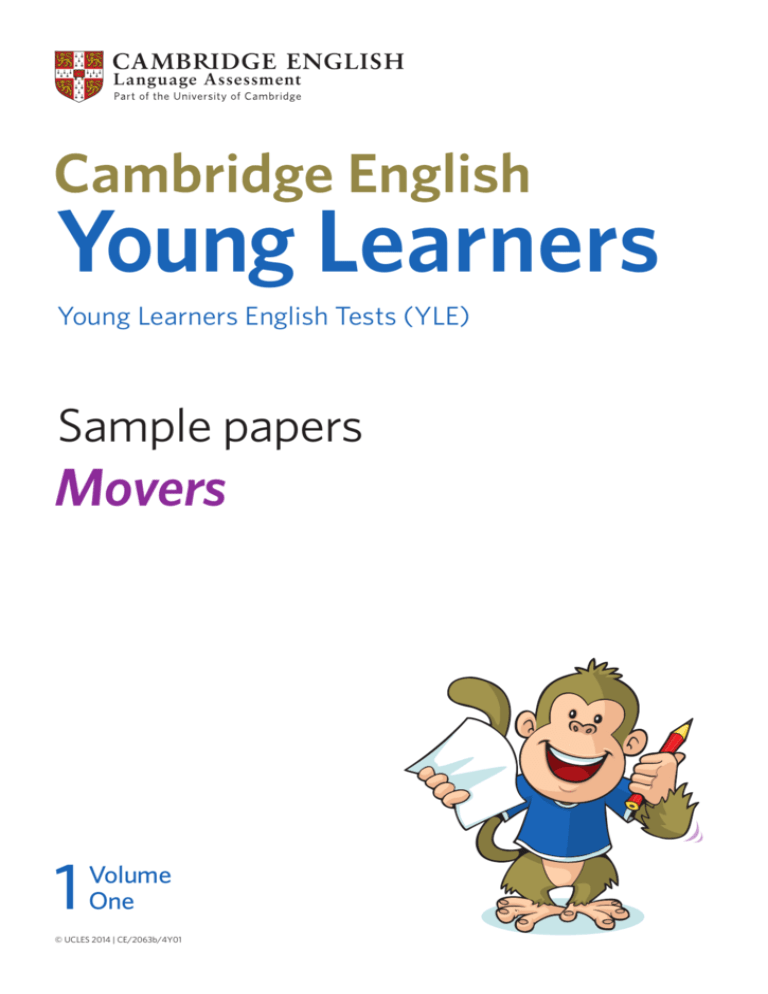
Young Learners Young Learners English Tests (YLE) Sample papers Movers 1 Volume One © UCLES 2014 | CE/2063b/4Y01 Introduction Cambridge English: Young Learners is a series of fun, motivating English language tests for children in primary and lower secondary education. The tests are an excellent way for children to gain confidence and improve their English. There are three levels: • Cambridge English: Starters • Cambridge English: Movers • Cambridge English: Flyers About these sample papers These sample papers show you what the Cambridge English: Movers test looks like. When children know what to expect in the test, they will feel more confident and prepared. To prepare for Cambridge English: Movers, children can practise parts of the test or do the complete practice test. Listening sample test To download the Cambridge English: Movers Listening sample test go to www.cambridgeenglish.org/movers-audio-sample-v1 For further information about the three levels of Cambridge English: Young Learners and for more sample papers, go to www.cambridgeenglish.org/younglearners Centre Number Candidate Number Cambridge Young Learners English Movers Listening Sample Paper There are 25 questions. You will need coloured pens and pencils. My name is: .......................................................................................... Movers Listening Go to the Introduction to download the Listening sample test. Movers Listening Part 1 – 5 questions – Listen and draw lines. There is one example. Peter Fred Mary Paul Daisy 3 Jane Sally – 5 questions – Listen and write. There is one example. Mr Mat‛s rabbit Likes drinking: carrot juice ...................................... 1 Colour of rabbit: ...................................... 2 Bought where: pet shop next to............. 3 Name of rabbit: ...................................... 4 Lives in: Mr Mat’s......................... 5 Likes eating: Mr Mat’s......................... 4 Movers Listening Part 2 Movers Listening Part 3 – 5 questions – What did Alex do last week? Listen and draw a line from the day to the correct picture. There is one example. Monday Tuesday Wednesday Thursday Friday Saturday Sunday 5 Movers Listening Part 4 – 5 questions – Listen and tick (✓) the box. There is one example. Which sport does John like? A 1 C How did Jack go to school yesterday? A 2 B B C B C Where’s Vicky? A 6 ✓ Movers Listening 3 How old is Jim? A 4 C What did Nick get for his birthday? A 5 B B C B C What’s in the bowl? A 7 – 5 questions – Listen and colour and draw. There is one example. 8 Movers Listening Part 5 Movers Listening Movers Listening Marking Key Part 3 5 marks Thursday Friday (example) Monday Wednesday Tuesday Saturday ( ) =Acceptable extra words are placed in brackets / =A single slash is placed between acceptable alternative words within an answer // =A double slash is placed between acceptable alternative complete answers Part 1 5 marks Lines should be drawn between: Part 4 5 marks 1A 1 Fred and boy with black hair, carrying lots of books 2B 2 Sally and woman working at computer, looking angry 4A 3 Daisy and girl under table, sitting on floor 4 Peter and boy standing on chair, taking book from bookcase 5 Jane and girl writing, with lots of books on the table Part 2 5 marks 1grey 2park 3B-A-K-E-R 4garden 5flowers 3C 5C Part 5 5 marks 1 Colour plant with round leaves – blue 2 Colour box on ground – green 3 Colour bigger rock – red 4 Draw cloud in sky, above house 5 Colour man’s hat – brown Tapescript I see. R Five F And who’s that? Mch Who do you mean? FThe girl who’s writing something. She’s got lots of books on the table next to her. R = rubric Fch = Female child F = Female adult Mch = Male child M = Male adult Mch Oh, that’s Jane. She’s doing her homework. F Was it difficult? MchYes! R Now listen to Part One again. That is the end of Part One. Part Two. Listen and look. There is one example. Fch Mr Mat? I want to buy a rabbit for a pet. M That’s a good idea. I’ve got a rabbit. R Hello. This is the Cambridge Movers Listening test. Look at Part One. Now look at the picture. Listen and look. There is one example. Fch Have you? What does your rabbit like to drink? Mch There’s a new library in the village, Grandma! M It likes drinking carrot juice. F Is there? That’s good! Fch Carrot juice? MchYes. I went there yesterday with some of my friends from school. Look! Here’s a picture. MYes. R Can you see the answer? Now you listen and write. F Let’s see. Where’s your friend Paul? One Mch There. He’s taking his coat off next to the window. Fch What colour’s your rabbit, Mr Mat? R Can you see the line? This is an example. Now you listen and draw lines. MThere are lots of different colours of rabbits, but mine’s grey. One Fch I’d like a grey rabbit too, I think. M Well, they’ve got some in town. R Two MchIt was funny when the cat ran in. It didn’t want to be outside in the rain. F Whose is it? Fch Where did you buy your rabbit, then? Mch It’s Fred’s cat. He’s the boy with the black hair. M I got it from the pet shop. Do you know it? F The one with all those books? Fch Do you mean the pet shop next to the park? MchYes. M That’s right. Next to the park. It’s got a pink door. R Two Fch Oh, yes. Mch Miss Dance wasn’t very happy. R Three F Is that the woman who’s working on the computer? Fch What’s your rabbit’s name? MchYes. M It’s Baker. F What’s her first name? Fch Do you spell that B-A-Y-K-E-R? Mch It’s Sally. She’s one of Mum’s friends. M There’s no Y in it. We spell it B-A-K-E-R. FOh! Fch That’s a funny name for a rabbit. R Three M Well, it’s a funny rabbit! F Who’s that? The girl under the table? R Four Mch That’s Daisy. Fch Where does it live? F But why is she sitting on the floor? M It lives in my garden. It’s too big for my flat. Mch Because there weren’t any more chairs to sit on! Fch Does your rabbit like living in your garden? R Four M (laughs) Oh yes! It’s very happy there. Mch And there’s Peter. I think you know him. R Five F Oh yes! But why is he standing on that chair? Fch But do you play with it? Mch He wanted a big book from the top of that bookcase. M Um … well, my children play with it more than I do. Movers Listening Movers Listening F Movers Listening Fch What does your rabbit like doing? M It likes eating my flowers! FchWhat? M Yes, eating my flowers! (laughing) R Now listen to Part Two again. That is the end of Part Two. Part Three. Look at the pictures. What did Alex do last week? Listen and look. There is one example. F Did you go to your uncle’s farm last week, Alex? Mch Yes. We all went. Mum and Dad and me. F What did you do there? Mch Well, on Friday I went for a long walk with the sheep. FWhy? MchYes. We gave a lot of old bread to the ducks there. There were lots and lots of them. F Lots and lots? Mch Well … (laughing) about ten. R Five Mch One day I wasn’t well. F Was that on Sunday? MchNo, it was Wednesday. I had a toothache. It hurt when I ate. F What did you do then? MchI read a book about dogs. I want to have one of the puppies! R Now listen to Part Three again. That is the end of Part Three. Part Four. Look at the pictures. Listen and look. There is one example. Which sport does John like? Fch Let’s go for a swim today, John. Mch We had to take them from the top field down to the lake. R Can you see the line from the word Friday? On Friday, Alex walked with the sheep. Now you listen and draw lines. One Mch On Monday, we played in my cousin’s boat. FchI haven’t got the right shoes … but do you enjoy fishing? We can do that. F Did you sail it? Mch No. I think it’s boring. Sorry! R Can you see the tick? Now you listen and tick the box. One. How did Jack go to school yesterday? F Do you go to school on the bus, Jack? Mch Yes, but not yesterday. F Why? Did you go in your Dad’s car? MchYes, but I got very cold that day. I ran back to the farm and had a hot shower in the afternoon. F (laughing) Oh dear! R Two F What did you do on Thursday? MchUm … Thursday? … I know. My cousin and I washed my uncle’s car, then we all went to the market. F What did you buy there? Mch Oh … some food for dinner. FOh. R Three Mch The weather was very sunny on most days. F Yes, but it was terrible on Saturday. Mch That’s right. We played inside. We played with the puppies. F How many have they got? MchThere are six of them. They’re very small. It was great playing with them. R Four F What about Tuesday? Did you go sailing again? MchNo. We went out in my uncle’s car again on Tuesday. We had a picnic next to a river. F Was it good? MchI don’t like swimming. How about a game of tennis? I like that … MchNo. I rode my bike because my friends and I like doing that sometimes. R Two. Where’s Vicky? Fch Where’s Vicky, Grandpa? M Vicky? She’s at the cinema, I think. Fch But her bag and jacket are here in the kitchen. Look! MOh, I know! She’s putting the clothes on the line in the garden. Fch OK. Thanks. I need to ask her something. R Three. How old is Jim? M How old is your son now, Anna? F You mean Jim? He’s seventeen now. MMy son’s sixteen. Did you know I’ve got a daughter too? F No. How old is she? M She’s twelve. FOh. Four. What did Nick get for his birthday? M Yes. Colour it red. F Did you have a good birthday, Nick? Fch OK … but that’s a funny colour for a rock! Mch Yes! I had some great presents, too! R Four F And what did your parents give you? A new phone? M Now … Let’s do some drawing. MchNo, I’ve got one of those. I wanted a guitar but they gave me a baseball bat. FchAll right. I enjoy drawing. I’ve got my pencil. What shall I draw? F That’s good! M Draw a cloud above the house. Can you do that? Mch Yes. I needed a new one. Fch A cloud? Yes, that’s easy. R Five. What’s in the bowl? R Five Fch What’s in that bowl, Dad? I can’t see … is it grapes? Fch It looks very hot there. Shall I colour the man’s hat? M No. They’re beans for dinner. M Yes. Do it brown please. Fch I don’t like those. Can we have some tomatoes? Fch OK. People should wear hats when it’s very sunny. M Not today. We haven’t got any. M Do you do that? Fch Can we go and buy some? Fch Yes, I always do. M Sorry. No. MGood! R Now listen to Part Four again. R Now listen to Part Five again. That is the end of Part Four. That is the end of the Movers Listening test. Part Five. Look at the picture. Listen and look. There is one example. M Would you like to colour some of this picture? FchYes … Is that kangaroo coming to help the man with his car? M(laughs) I don’t know. Would you like to colour it yellow? Fch The kangaroo? MYes. FchOK. R an you see the yellow kangaroo? This is C an example. Now you listen and colour and draw. One Fch Can I colour one of the plants too? M Which one? The one with the round leaves? Fch Yes. I like the one with the round leaves the most. M All right. Colour it blue. Fch OK. I like that colour. R Two M Now, can you see the box? Colour that for me next. Fch Do you mean the box on the ground? M That’s right. You choose the colour. Fch Shall I do it green? MOK. R Three Fch What shall I colour now? M Um … what about the big rock? Fch The one behind the people? Movers Listening R 14 Cambridge English: Young Learners Candidate Number Cambridge Young Learners English Movers Reading & Writing Sample Paper There are 40 questions. You have 30 minutes. You will need a pen or pencil. My name is: .......................................................................................... Movers Reading & Writing Centre Number Movers Reading & Writing Part 1 – 6 questions – Look and read. Choose the correct words and write them on the lines. There is one example. a aforest forest a supermarket a supermarket coffee coffee soup soup a cinema a cinema a mountain a mountain a village a village cheese cheese 2 Movers Reading & Writing Example You can shop for food, clothes and sometimes books here. a supermarket ............................. Questions 1 People sit inside here and watch films. ............................. 2 You can eat this food in a sandwich. ............................. 3 You can have this brown drink hot or cold. Some people put milk in it. ............................. 4 People live here. It is smaller than a town. ............................. 5 There are always a lot of trees here. ............................. 6 This can have meat or vegetables in it and you put it in bowls. ............................. 3 Movers Reading & Writing Part 2 – 6 questions – Look and read. Write yes or no. Examples It is a windy day. yes ................................. The baby in the picture is crying. no ................................. 4 1 The woman in the garden is holding a kite. ................................. The window which is above the door is round. ................................. 3 The boy with the scarf has curly hair. ................................. 4 The man on the balcony is taller than the woman who is next to him. ................................. The girl who is wearing a red sweater is skipping. ................................. There are some birds on top of the house. ................................. 2 5 6 5 Movers Reading & Writing Questions Movers Reading & Writing Part 3 – 6 questions – Read the text and choose the best answer. Example Paul: Fred, whose dog is that? Fred: A B C There it is. He’s mine. That’s new. Questions 1 Paul: Is he a new pet? Fred: A B C Yes, he is. Yes, he was. Yes, he can. 6 3 4 5 6 Paul: Who gave him to you? Fred: A B C Paul: Where does he sleep? Fred: A B C Paul: What's his name? Fred: A B C Fred: Would you like to come to the park with us? Paul: A B C Paul: Can I hold the dog? Fred: A B C My uncle was. My grandparents. I gave it to my mum. Every night. He sleeps a lot. In the garden. My name’s Fred. I like May. It's Pat. Yes, I’d like that. Yes, I like her. Yes, it’s like a park. I held it last week. OK, here you are. So do I. 7 Movers Reading & Writing 2 Movers Reading & Writing Part 4 – 7 questions – Read the story. Choose a word from the box. Write the correct word next to numbers 1–6. There is one example. My name’s Daisy. Yesterday was my first day ........................... in a new class at school. In the morning I got up quickly and went to the kitchen to have my (1) ........................... . My aunt Lucy was there with my mother. ‘Can I come with you this morning?’ my aunt said. ‘Yes!’ I said. I (2) ........................... a glass of orange juice and then went to my bedroom to get dressed. Then I picked up my new school books, and my aunt and I went out of the house. She came with me to the (3) ........................... and then I said, ‘Goodbye. See you!’ and I (4) ........................... to my new classroom to see my friends. A teacher (5) .......................... the door and came in. My aunt was with her! ‘Good morning, children!’ she said. ‘This is Mrs Weeks, your new teacher. She’s Daisy’s aunt.’ I laughed. I was very (6) ........................... ! 8 Movers Reading & Writing example day strong playground ran surprised breakfast toothache drank opened (7) Now choose the best name for the story. Tick one box. Daisy’s new teacher Mum comes to school An old classroom 9 Movers Reading & Writing Part 5 – 10 questions – Look at the pictures and read the story. Write some words to complete the sentences about the story. You can use 1, 2 or 3 words. Jim’s party My name is Jim. It was my birthday on Saturday. I was eight. My three cousins came to see me in the morning, and in the afternoon I had a party at my house. Nine of my friends came. We played some games outside and then we went inside to have some lemonade. Examples Jim's birthday was on Jim's Saturday . ................................ three cousins ................................ went to see him in the morning. Questions 1 There were party. 2 After the games, the children had house. .............................. 10 of Jim’s friends at his birthday ............................... in the Movers Reading & Writing Then Mum said, ‘Go out in the garden again.’ There was a clown there! He had square glasses, yellow hair and a long green beard. He told us a story about the jungle and drew some pictures. My friends and I laughed very loudly because he was very funny. My mum was there, but I couldn’t see my dad. We went inside and had ice cream and cake in the kitchen. Then my friends went home. 3 When the children went outside, they saw a ................................. 4 in the garden. The clown had a green beard and wore some ................................. which were square. ............................... 5 The 6 Jim and his was about the jungle. .............................. 11 laughed very loudly. Movers Reading & Writing I helped Mum to clean the kitchen and then we sat down and had some more cake there. ‘Where’s Dad?’ I asked Mum. ‘In the living room,’ she said. I went to find Dad but I could only see the clown there. Then I looked at his face. He took off his funny beard, his hair and his glasses and smiled at me. It was Dad! ‘Thank you, Dad!’ I said. ‘This was the best birthday present.’ 7 Jim and his mother ate ................................. in the kitchen. 8 Jim's father was in the ................................. . 9 The clown 10 The clown was Jim’s ................................. at Jim. ................................. 12 ! Movers Reading & Writing Blank Page Movers Reading & Writing Part 6 – 5 questions – Read the text. Choose the right words and write them on the lines. Zoos Example 1 Most big cities in the world have ......................... go there to see the animals, fish and birds a zoo. People ......................... come from different parts of the world. A lot of people go to zoos to see the lions and tigers or the elephants and giraffes 2 ............................. The 3 monkeys play they are very beautiful. a lot ............................. . It to is good for us 4 ............................. 5 ............................. and learn children about our like watching world, and the animals in it, and zoos can us to learn more. 14 Movers Reading & Writing Example have has having 1 which where what 2 but than because 3 they them theirs 4 all some every 5 help helping helps 15 Movers Reading & Writing Movers Reading & Writing Marking Key Part 4 7 marks 1breakfast 2drank 3playground 4ran 5opened 6surprised ( ) =Acceptable extra words are placed in brackets / =A single slash is placed between acceptable alternative words within an answer // =A double slash is placed between acceptable alternative complete answers 7 Daisy’s new teacher Part 5 10 marks 19/nine 2lemonade 3clown 4glasses 5story Part 1 6 marks 6friends 1 a cinema 7cake 2cheese 8 living room 3coffee 9smiled 4 a village 10dad 5 a forest Part 6 5 marks 6soup Part 2 6 marks 1which 2because 1yes 3them 2yes 4all 3yes 5help 4no 5yes 6no Part 3 6 marks 1A 2B 3C 4C 5A 6B Summary of Procedures The usher introduces the child to the examiner. The examiner asks how old the child is. 1The examiner asks the child to describe several differences between the two Find the Differences pictures, e.g. ‘This boy has got earache, but this boy has got stomach-ache.’ 2The examiner tells the child the name of the story and describes the first picture, e.g. ‘These pictures show a story. It’s called, “The dolphin’s new friend.” Look at the pictures first. (Pause) Sally and Jim are on the beach with their parents. The children want to go swimming.’ The examiner then asks the child to continue the story. 3The examiner demonstrates how to do this task with the first set of four odd-oneout pictures and then asks the child to choose one picture in the other three sets and say which is different and why. For example, ‘These animals can all fly, but this animal can’t fly.’ 4The examiner asks questions about the child, e.g. ‘What do you do with your friends at weekends?’ Movers Speaking Movers Speaking MOVERS SPEAKING. Find the Differences 1 Movers Speaking MOVERS SPEAKING. Picture Story 2 1 3 2 4 Movers Speaking MOVERS SPEAKING. Odd-one-out 3 Movers Speaking
